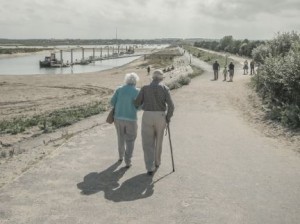“In sickness and in health” – many of us say those words on our wedding day and mean them with all sincerity. But let’s face it – most of us at the start of a relationship might expect to nurse our spouse through the flu or an injury. Do any of us really prepare for the reality of a partner becoming seriously or incurably ill? When the diagnosis is Alzheimer’s, the healthy spouse is hit with the impossible scenario of having to lose their best friend not only physically but emotionally, through the slow decline of their loving partner into someone fully dependent and potentially unrecognizable.
It’s no wonder, then, that partners of Alzheimer’s patients start a grief cycle upon diagnosis very similar to that of someone processing a sudden death. If you’re one of them, it’s important to acknowledge this normal and healthy reaction, and know there’s lots of help and support out there. Here are some insights on how you might begin to approach the early days post-diagnosis:
Allow the grief to happen.
We’ve all heard of different aspects of grief like denial, anger, even physical symptoms – all can come and go, and all come with the territory of grappling with Alzheimer’s. Denial in particular can be a powerful feeling in the early days; we all know enough about Alzheimer’s to want to pretend it’s not happening. But digging into denial can mean not getting your spouse the medical care she needs, or not getting yourself proper support. Connecting with a grief counselor or social worker can help guide you through these feelings productively and proactively, allowing you to move through them and function in a healthy way despite the stress of the situation.
Talk with your spouse.
As difficult as it might be to face certain realities, it’s important for you both to come together proactively on topics that matter – like whom to tell about the diagnosis, and how; any financial or legal matters that might need addressing in the short term; your spouse’s wishes about living arrangements or medical protocols.
Join a support group.
While you might be reluctant to share your feelings with strangers when you’re still trying to process them yourself, there are support groups geared towards early-stage caregivers that can be quite comforting and helpful. The Alzheimer’s Association website has a comprehensive directory that lets you look up groups by topic and state, and also has a number you can call. Consider going just to listen and learn, even if you’re not ready to talk about your personal situation.
Remember that each journey is different.
Like so many life challenges, an Alzheimer’s diagnosis can come with information overload from the internet, well-meaning friends, even TV and movies. Your spouse’s trajectory will be her own, and can’t be predicted on informational websites; and there are often misperceptions about Alzheimer’s that will never be relevant to your own situation. We found a great blog post that addresses this topic with common sense and compassion.
As always, the Alzheimer’s Association website is an invaluable resource for anyone touched by Alzheimer’s – definitely worth bookmarking.

